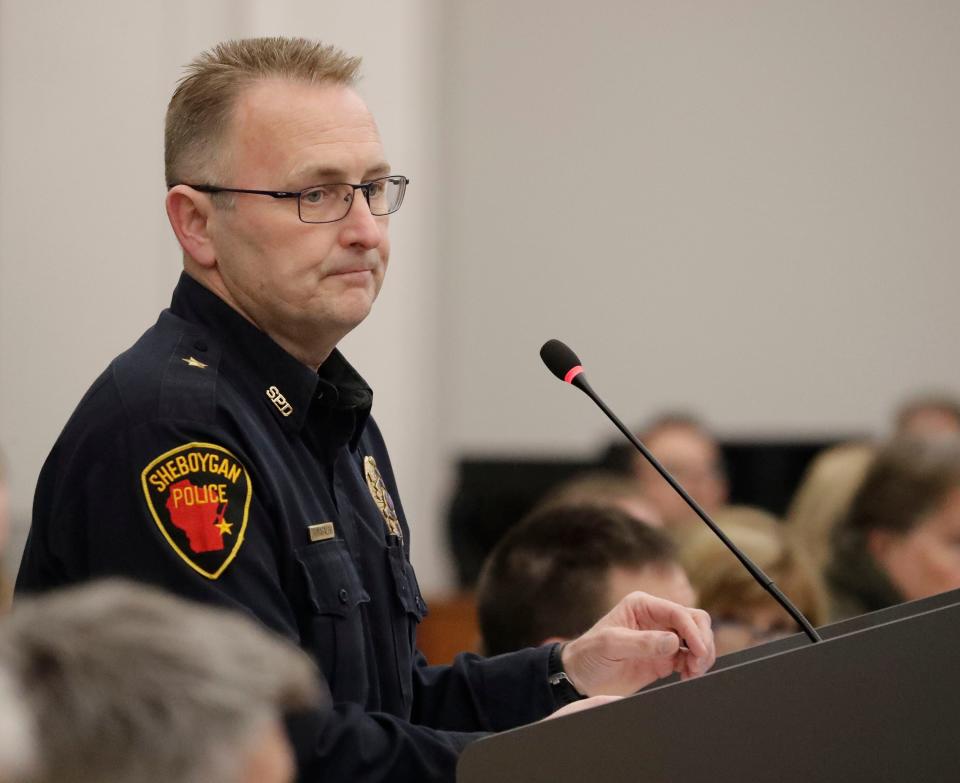Judge calls Sheboygan DA’s ‘rather routine’ protective orders on police files ‘concerning’

SHEBOYGAN — One Sheboygan County circuit court judge has expressed concern about what she said are an unprecedented number of motions from “the state” for protective orders of police officer files containing significant misconduct.
Circuit Court Judge Samantha Bastil raised the concern during a criminal hearing in December. The hearing was part of a case in which a Sheboygan police officer involved in the arrest of the defendant had a Brady determination, marking him as unable to testify in court for criminal cases.
Sheboygan County District Attorney Joel Urmanski had motioned to seal sections the officer’s personnel file containing Brady information. Namely, an internal investigation into nonconsensual showing of nude photographs that led to the officer’s resignation from the department.
Judge Bastil denied Urmanski's request to seal the documents. This allows the public access to the relevant sections of the file through court documents and does not bind defense with nondisclosure.
“Given the language of the protective order the state is seeking and legal analysis in its motion, which cites to open records case law, this court finds that this protective order is essentially the state seeking an order from this court to limit the public's access to a police officer's misconduct that rises to the level of being exculpatory evidence in a criminal investigation in which the officer was involved,” Bastil said.
Bastil said the request for protective orders has become “rather routine” in Sheboygan County, and in her more than a decade in the criminal justice system, she’s never seen anything like it.
“This bears the question: At what point does the public have a right to know about this pattern of misconduct of police officers in this community that rises to the level of being exculpatory?” she said.
In 2023, the DA’s office issued 34 criminal cases involving at least one Sheboygan County member of law enforcement with a Brady determination. When these individuals appear in a case, the office follows a policy developed in Dodge County designed to keep the personal information about the officer and their conduct out of the public eye.
In 2023, the office issued about 1,900 total criminal cases.
Six former officers are currently Brady listed by Urmanski’s office.
When motioning for a protective order like Urmanski did in this case, the burden of showing good cause is on the party seeking the order.
On Dec. 21, Judge Bastil found the burden was not met and denied the motion, ordering two versions of the personnel file be handed over, one redacted and one unredacted. Bastil granted the protective order for the unredacted version to protect victims’ names and any home addresses.
The criminal case itself pertains to a man charged with disorderly conduct and resisting an officer, both misdemeanors. He is suspected of being at a Kwik Trip, stumbling and appearing upset. When officers arrived on the scene and tried to take him out of his vehicle, he is suspected of engaging in a struggle. Officer George Rasavong and other officers eventually got the man into the back of Rasavong’s squad car.
Rasavong is one of the former officers currently Brady listed, sparking the policy and leading to the hearing.
What policy is Urmanski following?
In 1963, Brady v. Maryland determined the government cannot withhold any piece of information that may change the outcome of a case. This includes informing the defense if an officer with credibility concerns in their past was involved in the case.
The policy and procedure DA Urmanski uses when this information is relevant to a case was created by former Dodge County District Attorney Kurt Klomberg, Urmanski said.
“The practice I adopted of seeking a protective order over Brady materials was put together in another county with considerable thought and made available across the state,” Urmanski said in an email statement to the Sheboygan Press.
The policy says law enforcement disciplinary records with information covered in Brady and Giglio, another court case dealing with credibility, have “many difficulties” in the “logistics of discovery.” Namely, the material is generally contained in employment files and that information — that can be “negatively impacting on an officer’s wellbeing” — is often not admissible by a judge.
“The stated policy of the District Attorney is to seek to reduce dissemination of this information as much as can be achieved within the bounds of the law,” the policy says. “We do not want to be responsible for dissemination of the information that will be ultimately used to publicly humiliate an officer or damage his or her ability to earn a living.”
Urmanski said the policy prohibits the spread of the information, like posting reports online, while considering the admissibility of the material and allowing the defense to use the information.
The policy states while it’s understood the DA will not condone dishonest actions from police officers, relevant conduct documents will not be disclosed until certain steps are taken.
The first step is to send a stipulation and order to the defense attorney with the name of the officer in question. If signed by defense and the judge, the prosecution will hand over the documents.
If defense does not sign, the documentation will not be handed over without judicial involvement. Then, a hearing is to be had in which the prosecutor requests the signing of a nondisclosure order.
“In a few instances, defendants and/or defense attorneys have refused to agree to a protective order, at which time court action has occurred to determine how the information will be shared,” Urmanski said. “Resolution has also occurred without defense attorneys or defendants following up on notice of Brady materials, which could be for any number of reasons, including defense attorneys knowing the information from another case, audio/video recordings, a defendant’s statements, or other evidence.”
Urmanski said he wants to use this policy to give current and incoming officers a sense of privacy and also the ability to rest assured the defendant will be able to see and use the information.
On Oct. 3, 2023, the DA’s office sent the stipulation to defense, naming Rasavong as the officer involved.

What’s in the file?
Because Judge Bastil ruled a redacted copy of the Brady material in Rasavong’s personnel file be given to defense, Sheboygan Press gained a copy through court documents. The entire file was also provided by the Sheboygan Police Department as an open record.
The personnel file holds information like Rasavong’s June 29, 2020, start date, but also includes an internal investigation that found Rasavong failed to adhere to multiple sections of SPD policies.
Rasavong could not be reached for comment for this article.
According to the investigation report, Rasavong solicited a female officer he seemed to be friends with into sending him a nude photo of herself.
“He assures her that he will delete it immediately and tells her that he will save a mental copy of the image,” according to the report.
Later, Rasavong met with a friend — and co-worker of the victim — off-duty at a local restaurant where they talked about an article from the Sheboygan Press about sexual harassment in the department. The subject of nude photos, also mentioned in the article, came up in conversation.
The report says Rasavong then showed the person the photo, knowing they were a co-worker of the victim.
During an interview with an outside detective about a possible Wisconsin Statute violation, conducted by an Ozaukee County Sheriff’s Department detective, Rasavong was asked if he sent or showed the photos to anyone, and Rasavong denied each time.
Two days later, he emailed a written statement to the detective saying, “at no point did I ever show, upload, share, save, or download these photos to be provided or viewed by others,” the investigation read.
Rasavong again denied sharing the photos when asked by a lieutenant. When confronted that the person who was shown the photos admitted what happened, Rasavong admitted to holding up his phone so the other person could see.
The investigation concluded Rasavong was dishonest in his answers and written statements to the detective and misrepresented material facts during the investigation.
On March 31, 2023, Sheboygan Police Chief Christopher Domagalski reviewed the investigation and served Rasavong a Loudermill letter, the report read. A Loudermill letter is a notice given to a public employee, prior to their termination, explaining any charges against them, the employer's evidence and a hearing opportunity to tell their side of the story.
Rasavong resigned, effective April 14, 2023.
Another exhibit in the file is Rasavong’s resignation letter. That memorandum was stamped and signed April 10, 2023, by Domagalski and has two handwritten notes under the stamp and signature, one reading that Rasavong understands the decision is final.
“George has been a reliable and consistent employee,” the other reads.
Domagalski did not immediately respond to a request for comment for this story.

'It is frankly very concerning that the state even uses this analysis as justification.'
On Dec. 12, 2023, the DA’s office filed a motion for a protective order that would allow defense to use the information in the file, but not allow for the information to be spread outside of court.
In the December hearing, Urmanski said defense has “every right” to the Brady material and he does not intend to keep it from them. Transparency is important, he said, and he doesn’t want anyone to think there’s any attempt to cover for an officer.
One reason given by the state for the need of a protective order is the “sensitive nature of the information,” referencing State ex rel. Journal Sentinel, Inc. v. Arreola, a case discussing how the public’s interest in monitoring police use of deadly force outweighed officers' privacy interests.
In the hearing, Urmanski said he agrees with the Dodge County policy that the dissemination of the material can be negatively impactful on the officer for “ultimately no relevant purpose” because it is often not admissible.
“Defense needs and will get this information,” Urmanski said. “My request is that it be in a protective order, because there is no reason that it needs to be put on the internet or otherwise shared, it's being offered and is necessary in this case for purposes of the defense of the defendant.”
Judge Bastil pointed out the Journal Sentinel case referenced in the protective order “made it clear” just because something is a personnel record, doesn’t automatically mean there is good cause to protect it.
Another justification given by prosecution for the order was the record "involves others and behaviors or actions of others" — presumably those carrying out the investigation into Rasavong's behavior — and the document release “could have a devastating impact on them,” referencing Democratic Party of Wisconsin v. Department of Justice, 2016.
“It is frankly very concerning that the state even uses this analysis as justification,” Bastil said.
The case, she explained, involved intimate, confidential information about a child victim in a child enticement case and the Wisconsin Supreme Court “recognized the devastating impact” disclosure could have on victims.
Bastil also pointed out a section of that decision that reads, “Another factor to balance in these cases is the presence of 'official cover-up' by public officials. Hempel,284 Wis.2d162, ¶68. ‘The public has a very strong interest in being informed about public officials who have been derelict in their duty.’”
Bastil then stated: “To use a case where the paramount concern by the Wisconsin Supreme Court is the confidentiality of child victims and the devastating impact this could have on a child victim and try to relate that to police misconduct that rises to the level of a Brady/Giglio violation is just plain wrong.”
Defense attorney Melissa Barrette said the public has a right to the information in the personnel file.
“The state is not seeking a protective order to limit exposure to the alleged victim of Officer Rasavong," she said. “That would be appropriate.”
Bastil agreed, saying when an individual becomes a police officer, “they abandon certain privacy rights and must be subject to public scrutiny.”
Deterrence is also an important factor to consider in this case, Bastil said.
“Sweeping police misconduct that rises to the level of Brady/Giglio material under the rug does not deter this type of behavior from occurring in the future,” she said.
It didn’t deter Rasavong, she said, nor does it deter others.
“The level of police misconduct in this community that has risen to the level of Brady/Giglio material needs to be deterred,” Bastil said. “The policies of the Sheboygan County District Attorney's Office in seeking a protective order in these instances clearly is not having a deterrent effect.”
Barrette also mentioned a similar concern, saying in her opinion, “this is a gag order” because they don’t want the public to know what happened.
“I understand why,” she said. “But maybe if the public had known, we wouldn't be here with another officer" acting inappropriately and "then having it being covered up.”
Bastil did make a point in saying there are police officers in the county who hold themselves to a higher standard.
DA says comments extended beyond the scope of the hearing
After Bastil made her decision and other scheduling matters were taken care of for the case, Urmanski said that while the defense will get the material, he felt there were some statements made by Barrette beyond the scope of the hearing.
He said the investigation is not connected with the larger issue addressed and the investigation was carried out by another law enforcement agency outside of the county.
Bastil asked if he was talking about the “Pray incident,” and Urmanski said no.
Last year, the Sheboygan Press reported on internal investigations in the police department that found multiple people, including former officer Bryan Pray, were disciplined for sexual harassment. Pray is also one of the officers with a Brady distinction in the county.
Urmanski said that in Rasavong’s case, there was no referral of criminal wrongdoing, and as he understands, Rasavong was not on duty when the activities occurred.
“It's not me in any way saying we're not going to abide by the court's order,” Urmanski said. “As I said more than once, we want defense to have the material. But because things went further, and media is here, for whatever reason, I think that it's important that that information also be shared.”
Barrette said she doesn’t believe she went outside the scope of the motion and Urmanski brought up the resignation letter the chief signed. Barrette had mentioned Domagalski’s notes earlier in the hearing.
“He then has a resignation letter stamped by the chief calling him a reliable and consistent officer, and I think the public deserves to know that,” Barrette said.
Bastil ended the hearing saying she does not expect Urmanski to comment on Domagalski.
“As you all indicated, we're well beyond the scope of this hearing here today,” she said. “But DA Urmanski, at least as it relates to this court, I do not anticipate any additional requests for protective orders as it relates to officers' Brady/Giglio materials.”
On Feb. 12, Urmanski wrote a letter to Judge Bastil advising the state will be moving to court to reconsider its order that defense be given an unredacted version of the documents. After receiving the unredacted version, the state found they included personal identifying information, beyond name, of multiple law enforcement members, Urmanski said in the letter.
Have a story tip or public interest concern? Contact Sam Bailey at sgbailey@gannett.com or 573-256-9937. To stay up to date on her stories and other news, follow her on X (Twitter) @SamarahBailey.
This article originally appeared on Sheboygan Press: Judge calls Sheboygan DA's protective orders on police files concerning

